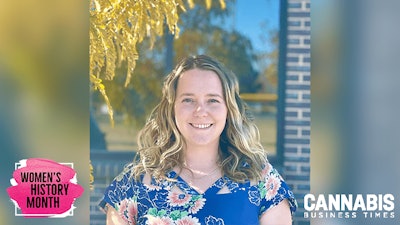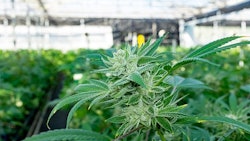
Indoor cannabis cultivation consumes a lot of energy, to put it mildly. This basic fact means that sustainable business practices and mindful energy conservation go a long way to limiting a company’s carbon footprint. Increasingly, companies are prioritizing that work by building out specific roles or even departments to manage goals and oversee implementation of new strategies.
Elizabeth “Libby” Lee is the environmental health and safety manager at Veritas Fine Cannabis in Colorado. She has brought to the company a strong passion for drawing down wasteful habits and single-use products. And she’s done this through goal-setting and clear communication—within Veritas, but also with the broader industry at large.
Here, Lee shares her perspective on sustainable business practices in the cannabis space—and how we all might set goals to improve our environmental standing.
Eric Sandy: How did you get into the cannabis industry?
Elizabeth Lee: I graduated in 2017 from American University in Washington, D.C., and I had actually never visited Colorado, so I decided to venture out and come move here. I had an environmental studies degree, so I felt that I could find a job within that realm. I decided to attend a cannabis sustainability happy hour, and I met a few people who worked in the industry. From there, I started working in a dispensary, and I moved up from there—they were a grow, as well. So, I got to experience a smaller aspect of the cannabis industry. From there, I decided that I wanted to see the back of house a little bit more. I ventured out and became interested in Veritas, and put in an application. I started at Veritas in March 2020 as a packager and began to show what my skills were—but also my passion and my interest in incorporating environmental health and safety sustainability into the cannabis industry.
ES: Could you define that term, “sustainability,” just in terms of what it means to you or what it means to the company?
EL: When I was in college I minored in sustainability, so this is always an interesting question because you can take it from so many different viewpoints—in the sense of a business and the environmental ethics standpoint. But in a sense of cannabis and sustainability, I see sustainability as preserving and using our resources in a way that we're not overexerting them to the point of extinction—but also preserving them for future generations as well. We want to be growing cannabis to the end of time, and, especially growing cannabis inside, this is always going to be around. It comes down to ensuring that we can preserve our resources and use less energy through LEDs or improving our HVAC systems.
ES: With certain goals like that, what are some of the big challenges—on either a day-to-day basis or even on a longer-term basis—that you and your team are working to surmount?
EL: A lot of the topics that we're focusing on right now would be waste and energy usage. The cannabis industry uses a lot of energy. Think about HVAC systems, but also running LEDs or high-pressure sodium (HPS) lights for 12 to 24 hours a day in some facilities. Energy is something that we definitely need to consider for the industry.
ES: With Veritas in particular, what are some of the goals that the company might be setting on a regular basis when it comes to energy usage? And how does the company communicate the importance of sustainability to employees and customers?
EL: We are focusing on retrofitting our grow rooms right now and testing LEDs in our grow rooms to show that using those will reduce our energy reliance. Another thing that we're focusing on is waste reduction. That comes down to just understanding our packaging waste and where our waste goes,. We’re working to ensure that we're recycling properly, but also for Veritas, which is something I really appreciate about this company, we use glass jars right now. That’s a big step toward being more sustainable in the sense for just packaging in general. We already took that step to use glass jars to ensure that we are not sending as much plastic or Mylar bags to the recycling or the trash.
One of our goals for 2022 is to create an initiative to encourage customers to bring back their jars to dispensaries after they’re empty. They will bring them back to the dispensary and dispose of them. We hope to build an initiative where we collect the jars, sanitize them and put them back into our production.
ES: How have you felt being a part of the cannabis industry? The reason I ask is that it operates so differently than most other industries. I'm curious if maybe there were a lot of surprises when you got into this type of business compared to what you may have been studying in college.
EL: Previous to moving to Colorado, I interned at an environmental working group in Washington, D.C. I was working at this nonprofit organization that lobbied for environmental health and safety regulations. Coming into the cannabis industry was a very big surprise to me. It was well established, but not as well established as other industries—manufacturing industries, car industries. And in the sense of regulations, we don't have federal regulations always beating down on us. It's really up to the state to enforce and regulate this industry. It was definitely different.
As the industry has progressed over the few years that I've been in it, I would say that the professionalism has become more on the forefront. We need to align more with federal regulations when it comes to that time. As businesses we should be already considering the federal regulations, and even those of the EPA or of OSHA. Over time, I feel like that's been more on the forefront and there's been a little bit more of the corporate aspects of the business. I think that’s very about beneficial to bring us all together and get more standards set for the industry as well.
ES: From your vantage point, either within Colorado or on the sustainability side of the industry, what advice would you give to someone who may be coming out of college in 2022, with perhaps the same degree that you have, who may be looking at cannabis?
EL: I definitely had to step out of my comfort zone a little bit and really network myself in this industry. There is a lot of opportunity for that, and being able to attend meetings and get yourself out there to show yourself what you’re able to do is definitely what I would suggest. When I first came into the industry, I got my first job, like I said, from going to a happy hour. Previous to working at Veritas, I would network myself through these happy hours and go to cannabis sustainability symposiums or any events related to either cannabis or health and safety or the environment or sustainability. The industry can be really small, and so word of mouth and just knowing a lot of people in the industry has really helped me out.
ES: Cannabis can take its criticism for a perceived lack of diversity. And there are a lot of ways to define that, but in terms of women working in the industry, do you see that it’s fairly equitable, compared to other environmental career paths, or is there some work that needs to be done there?
EL: I think, like with all industries, there always is work that needs to be done in order to be equitable. There's been a lot of improvement, I'd say, for women in leadership roles, but that has definitely taken time. We've been in a recreational industry since [Colorado voters approved a legalization measure in] 2012. So, it definitely has taken a lot of time to get to the place that we are now. I definitely had to network and work a little bit harder than my male counterparts, but I would say that over time it has gotten better from my experience. Working at Veritas, I'm actually very surprised at how many women hold leadership roles here and the opportunity for everyone to earn a leadership role. I believe we have progressed, for sure, but there is always room for improvement.
ES: Looking ahead, what sort of goals do you have at Veritas or in the industry in general?
EL: I am going to get my master’s degree right now at Denver University for environmental health and safety. I will be graduating in June. Some goals from my degree that I really want to implement and have started implementing are creating a health and safety program here at Veritas. There's not really much of a discussion on the health and safety of employees throughout businesses—for trimming and all aspects of packaging, things like that. I'm really focusing on creating job-specific health and safety programs and training to ensure that employees have the proper resources to do their job safely, but also understand the repercussions that can arise from doing your job in an unsafe environment. That's one of the big things right now that I'm working on that starts for a whole year. I hope to continue to do training throughout that as well.
The other project, like I mentioned before, was the jar initiative. I really hope to get an initiative rolling in the next few months to start collecting and reusing the jars for Veritas, and then see if we can get other cannabis businesses on board as well.


























